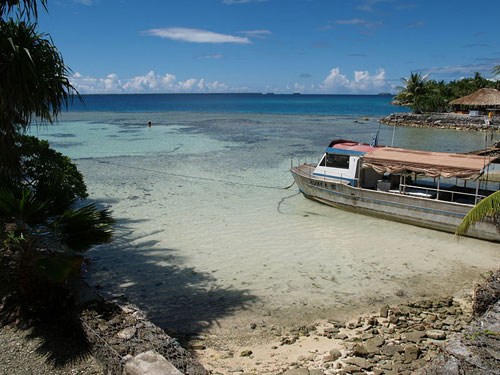By Rich Bowden
One of the least reported, though possibly one of the most important, announcements to come out of the recent climate change gabfest in Durban earlier this month was the one from tiny Tokelau, with a population 1,500 (and three cars as reported by the Guardian). The Pacific state said it is planning to replace its aged diesel generators with a $US7.5 million solar PV system.
The move, if it goes ahead, will mean Tokelau becomes the first country to source 100 percent of its energy from renewables with around 93 percent of the its energy being sourced from solar and 7 percent from locally grown oil. The tiny Pacific microstate, situated halfway between Hawa’ii and New Zealand — from which it is administered — used its platform at the Durban talks to mischievously call on the rest of the world to follow its lead.
Skilfully using his moment in the sun (ahem), leader Foua Toloa told a meeting on the fringes of the UN climate conference that “By September next year, we will become the first nation using 100%-renewable energy, and number one in percentage greenhouse gas reduction in the Pacific and elsewhere.”
The country has decided to become a world leader in terms of percent of its use of solar energy to set the example to reduce carbon emissions. Tokelau is one of the Pacific islands which will be most affected by any changes in sea levels brought about by global warming.
All great I hear you say, but there is one fly in the ointment (or cloud on the horizon) — funding for the venture is not fully secured. According to The Guardian report, the tiny state must find $900,000 of the share of the $7.5 million project, money the microstate was hoping to obtain from the Green Climate Fund. The fund was agreed to by countries in last year’s Copenhagen talks however while launched officially at Durban, matters such as how to unlock finance from the fund as well as finding sources, have yet to be determined.
But good luck Tokelau…the world’s leader in the use of renewable energy as a percentage of its energy (if all goes well). Whether this will be the template for other Pacific nations who are also threatened with climate change, remains to be seen. If it eventuates, Tokelau will expect to save 12,000 tonnes of CO2 during the operational life span of the 1MW solar power plant,according to The Guardian.
Toloa is obviously proud of his country’s world leadership in renewables. “No more noisy generators will disturb the quiet of the islands. We will be an example to the world, even though we have done nothing to deserve this,” he said.


 RSS - Posts
RSS - Posts



[…] Recently we have seen the micro state of Toukelau upgrade its inefficient and dirty diesel system of energy with solar power. (See SolarQuotes article here). […]